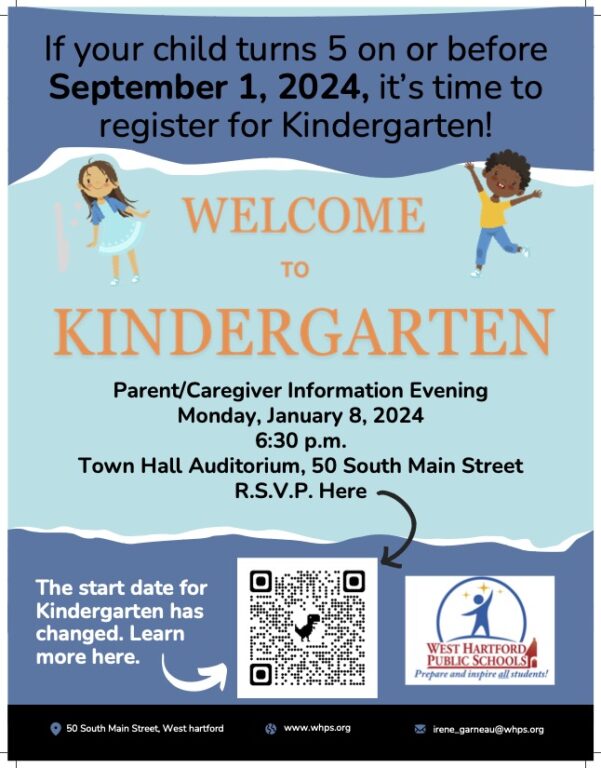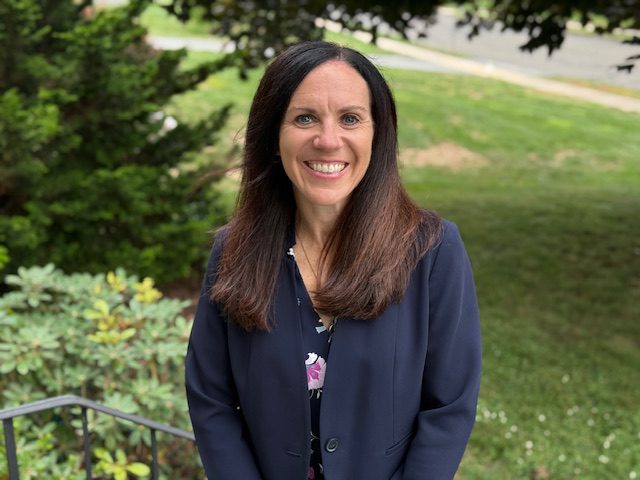New Kindergarten Age Cutoff in 2024: What It Means for West Hartford Families

Audio By Carbonatix

Pre-K and kindergarten students sing a song. Webster Hill butterfly release on Sept. 13, 2019. Photo credit: Ronni Newton (we-ha.com file photo)
West Hartford Public Schools is planning for a change in the kindergarten entry age, and will hold a ‘Welcome to Kindergarten’ information meeting on Monday, Jan. 8, 2024.

Courtesy image
By Ronni Newton
West Hartford Public Schools Superintendent Paul Vicinus expects about 150 families to be directly impacted next fall by Connecticut’s change in the cutoff date for kindergarten eligibility, but the change will undoubtedly cause a ripple effect on private and public preschool enrollment and could also potentially create financial hardship for families.
Connecticut’s legislature, at the tail end of its session in 2023, adopted Public Act 23-208. As part of that legislation, as of 2024 the birth date cutoff for kindergarten eligibility becomes Sept. 1, meaning that a child must turn 5 by Sept. 1, 2024 in order to be automatically eligible to enter kindergarten for the 2024-2025 academic year.
For decades, the state had a cutoff date of Jan. 1, which meant that potentially a third of all incoming kindergartners could still be 4 years old when beginning their official schooling.
In reality, however, many families with what educators refer to as “ber babies” (those born in the last four months of the years, which end with “ber”), chose to hold their children back so they would be at least 5 – or in some cases nearly 6 – before starting kindergarten. Over the years reasons for holding students back have included families’ own determination that their child is neither socially, emotionally, nor academically ready for a full-day in a kindergarten classroom, or the decision may have been driven by a desire to ensure their child is not always the youngest in their peer group.
Irene Garneau, the department supervisor for Early Childhood Education, said during a presentation to the West Hartford Board of Education on Dec. 19 that unlike the previous law regarding the start date for kindergarten, a new caveat now allows a request for early entrance, creating a circumstance not encountered before.
The entry date change to Sept. 1 is statewide, and mandatory for public school districts, although the measure does allow for districts to permit early entrance into kindergarten if formally requested and subject to an assessment of the child’s readiness.

Kindergartners at Smith STEM on the first day of West Hartford Public Schools. Aug. 30, 2023. Photo credit: Ronni Newton (we-ha.com file photo)
Why the change?
Connecticut had the youngest school entry age of any state in the country. While requirements vary, some states require that students turn 5 as early as July 1 before entering kindergarten, Garneau said.
“We are absolutely the last state to make a change to where children have to be age 5,” Vicinus said in a phone interview with We-Ha.com. “It’s grounded in research that’s demonstrated nationally and locally that readiness improves by age 5.”
In a presentation to the Board of Education last week, district leaders cited national longitudinal studies and a review of local longitudinal assessment data, which “indicate that students who begin kindergarten in September at 5 years old have statistically stronger performance on several educational measures than students who enter kindergarten at age 4.”

West Hartford Public Schools
Locally, the “ber babies” who started kindergarten at age 4 continue to underperform their peers on grade 3 literacy and mathematics assessments by 12 and 14 points respectively based on a review of data dating back to 2017, not counting the COVID years. The report also highlighted a comparison of achievement data between children who were held back from starting kindergarten at age 4, and states “when comparing 7-year-old ‘ber babies’ to 8-year-old ‘ber babies’ in the same third-grade class, these differences increase to 16 and 18-point gaps, respectively.”
Vicinus said younger students are also more likely to require various types of intervention. Assistant Superintendent Anne McKernan told that Board of Education last week that 50% of students receiving math intervention are “ber babies,” and 37% receiving literacy intervention are “ber babies,” although children born between Sept. 2 and Jan. 1 only account for 28% of the classroom population.
Having a combination of children who have started kindergarten at age 4 under the previous cutoff date, mixed in with children who were held back, creates a population of very young students in a classroom with a 16-month age range, which can be challenging for teachers.
The goal of changing the cutoff date in Connecticut is to better align the state with the rest of the country, and to benefit the health and wellbeing of children, Garneau said.
What does the change mean for West Hartford families?
Vicinus said it’s critically important that the kindergarten cutoff date is clearly communicated to families, and that the process of obtaining early entrance is equitable.
“Our difficulty in this is navigating the adherence and compliance to the new state law with the understanding of the intent behind it, while also supporting families who might be requesting a waiver for early entry – and doing it in an equitable way,” Vicinus said.
What if a parent believes their child will be ready for kindergarten before age 5?
The legislation allows for districts to establish an early entrance protocol.
“On an individual basis there can always be exceptions,” Vicinus said. He added that the state recognizes that this change is being made at a time when before- and after-care, and pre-K options, are not readily available.
But while the new cutoff date of Sept. 1 is objective, the process of applying for early entrance is subjective and has been left up to each district to implement.
“There’s state guidance, but not a uniform standard,” Vicinus said. “That obviously makes it a challenge for the school district to make sure we are doing this equitably not just as a town, but as a state.”
“Each district in the state is left to create their own process,” Garneau told the Board of Education, and West Hartford is trying to follow “letter and spirit” of the law.
West Hartford is in the process of finalizing criteria for determining whether a child born between Sept. 2 and Jan. 1 should be granted a waiver and permitted to enter kindergarten early, and will apply nationally-normed metrics for foundational literacy, numeracy, and social skills and self-help abilities – skills that Vicinus said are already assessed at kindergarten registration.
Early entrance to kindergarten will likely be “the exception not the rule,” Garneau said.
“The assessments will be nationally normed. They will be informed by multiple sources,” Garneau said, adding that it is important to look at the “whole child.”
The process will include completion of a questionnaire by parents and/or caregivers and will also include individual conversations with families, Vicinus said, and preschool options will be part of the conversation. “We recognize that private and public pre-K situations can place a burden on families,” he said.

A kindergartner arrives at Smith STEM for his first day of West Hartford Public Schools. Aug. 30, 2023. Photo credit: Ronni Newton (we-ha.com file photo)
What will happen to the number of kindergarten sections in West Hartford Public Schools, and to the enrollment in the district’s pre-K classrooms?
The district is currently estimating that anywhere from 100 to 140 fewer kindergarteners may enroll in West Hartford Public Schools for the fall of 2024, but that number also depends on how many waivers are requested and granted. The figure should come into better focus by the end of February, once the early entrance process is completed.
According to Garneau, there are currently 28 students enrolled in the town’s pre-K programs who are “ber babies” and would be directly impacted by the legislation. It’s not yet known how many may request and/or be granted waivers, but all will be guaranteed their pre-K slots next fall.
Vicinus said there are currently 144 pre-K seats in the district – at Charter Oak International Academy, Smith STEM, and Webster Hill – and it will be likely that the district will accept fewer incoming students since the number of spaces can’t be expanded. Pre-K entrance dates will be changing in alignment with the kindergarten entrance age requirement as well, with children required to be age 3 by Sept. 1 to enter a “3s” program and age 4 by Sept. 1 for a “4s” program.
Students with special needs who are eligible for the district’s Early Learning Center at Whiting Lane and Aiken will still be able to enroll based on the current rolling admission process, becoming eligible as soon as they turn 3. “There’s no change to that,” Vicinus said, and they anticipate 20-25 “ber babies” remaining in the ELC for the 2024-2025 school year.
West Hartford previously obtained a Smart Start grant used to fund for two additional preschool classes at Webster Hill Elementary School, but those funds are scheduled to dry up on July 1, 2o24.
“I am not aware of any extension or new funding,” Vicinus said, but while additional grant money would be welcome news, he is hopeful those pre-K classrooms will continue to operate, especially with the increased need.
“We are committed to maintaining those sessions, but that will move into our town budget,” Vicinus said. As the budget process gets underway, January and February are critical months for the district to get a good sense of the number of incoming kindergarteners, he said.
How are parents and caregivers finding out about kindergarten eligibility changes and the waiver process?
The district is looking to create as broad as possible awareness of the kindergarten enrollment changes.
Announcements about the new cutoff date have been shared with families who already have students enrolled in West Hartford Public Schools, and families with children enrolled in all public and private preschool programs have also been informed. There are also plans to distribute flyers through the town’s Leisure Services and Social Services activities, and at locations throughout the community including pediatrician’s offices, the libraries, Westmoor Park, and at other child-centered venues in town.
A postcard with a QR code linking to a West Hartford Public Schools document with details about the cutoff date and early entry request process is being mailed out this week to every household in West Hartford with a child under the age of 6, and is available in the district’s four most prevalent languages: English, Spanish, Portuguese, and Vietnamese. The information then accessed through the QR code on the mailer, which links to the district’s smore platform – which is accessible via smartphone as well as computer – can be translated into roughly 100 languages.
Lawn signs are also being created and will be posted this week at schools, parks, and other community sites. The media, and social media, will also be used to inform the community about the enrollment change.
While the early enrollment process must be completed by Feb. 29, 2024 for existing residents, new families with kindergarten-age children that move to West Hartford later in the year will be given the opportunity to obtain a waiver.
Will parents of children with summer birthdays start holding them back?
State statute requires children to begin school by age 5 – whether that’s in a public, private, parochial, or home-school setting – and the longtime of holding back “ber babies” who were still 4 did not violate those guidelines or require any special action.
“Our data shows that for the families that made that choice, performance is very strong,” Vicinus said.
Parents or caregivers are able to hold their children out of school until age 7, but if the child is already 5, an option form must be signed at the school district office, according to state statute.
There are always exceptions, and there is a process, but a primary reason for the state changing the enrollment date is because there is a marked difference in readiness between 4- and 5-year-olds.
With the change in enrollment age, there may be some parents of babies born in the summer months who choose to hold their children back even though they are technically required to be in school. It’s impossible to predict that impact as of now, Vicinus said.
Next steps
“We have a commitment with this change to working with all families on their individual circumstances, and will provide the guidance in the best interest of their child, and we are happy to partner with them,” Vicinus said.
To RSVP for the “Welcome to Kindergarten” program for parents and caregivers, scheduled for Monday, Jan. 8, 2024, from 6:30-8 p.m. in the West Hartford Town Hall auditorium, 50 South Main Street, click here.
Those with children born between Sept. 1, 2019 and Jan. 1, 2020, who would like to have their child enter kindergarten early, should complete the Request for Early Kindergarten Entrance Form no later than Feb. 1, 2024. Completion of the form will serve as a formal written request for early entrance, and in-person assessments, which are required, will be scheduled to take place between Feb. 7 and Feb. 23, with notification made by Feb. 29.
According to West Hartford Public Schools: “Parents/guardians of children born after September 1, 2019 should NOT initiate registration for Kindergarten until they have received a final decision from the Principal/School District.”
Garner said last week that there had already been nearly 1,400 viewings of the electronic newsletter. that provides additional detail about the change in kindergarten age eligibility, and 31 families had already requested early entrance. Decisions will be announced by Feb. 29, in order to allow parents time to inform their current preschool programs about their plans.
“It’s also a change for our early childhood programs and providers in town,” Garneau said.
Garneau said the state’s Office of Early Childhood is working hard on finding solutions.
“It is a big change. It is one of the biggest changes we’ve seen,” McKernan said.
Like what you see here? Click here to subscribe to We-Ha’s newsletter so you’ll always be in the know about what’s happening in West Hartford! Click the blue button below to become a supporter of We-Ha.com and our efforts to continue producing quality journalism.



